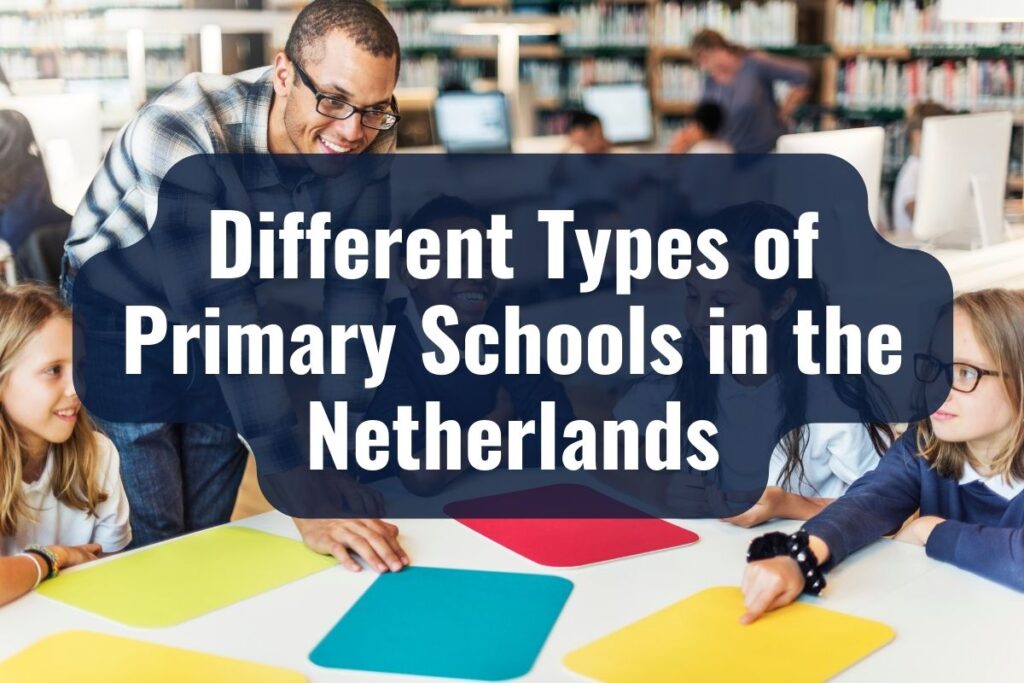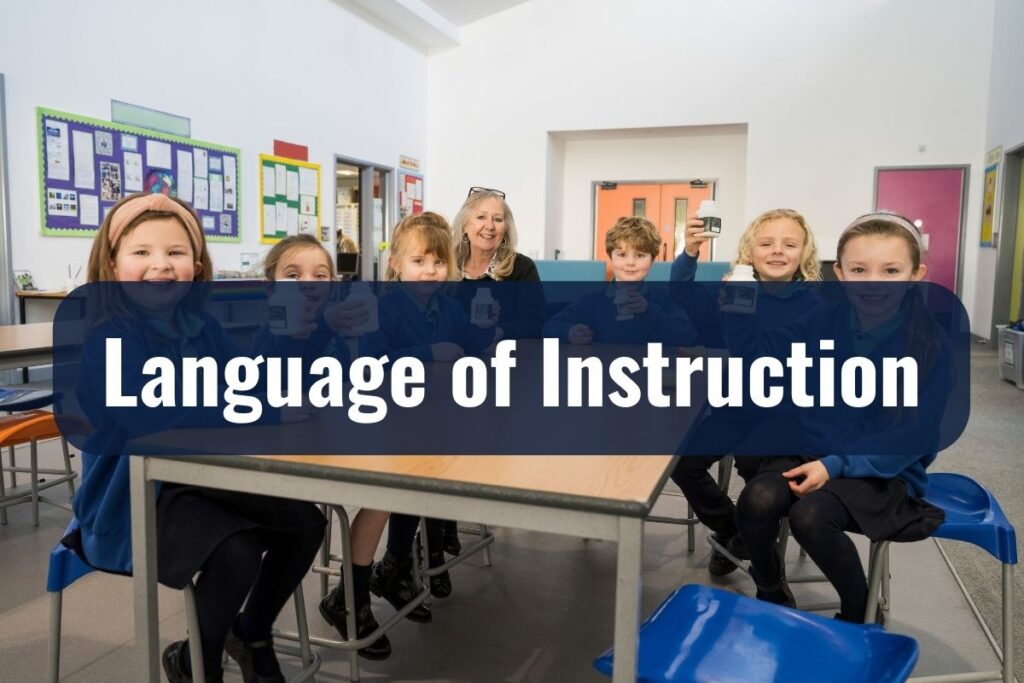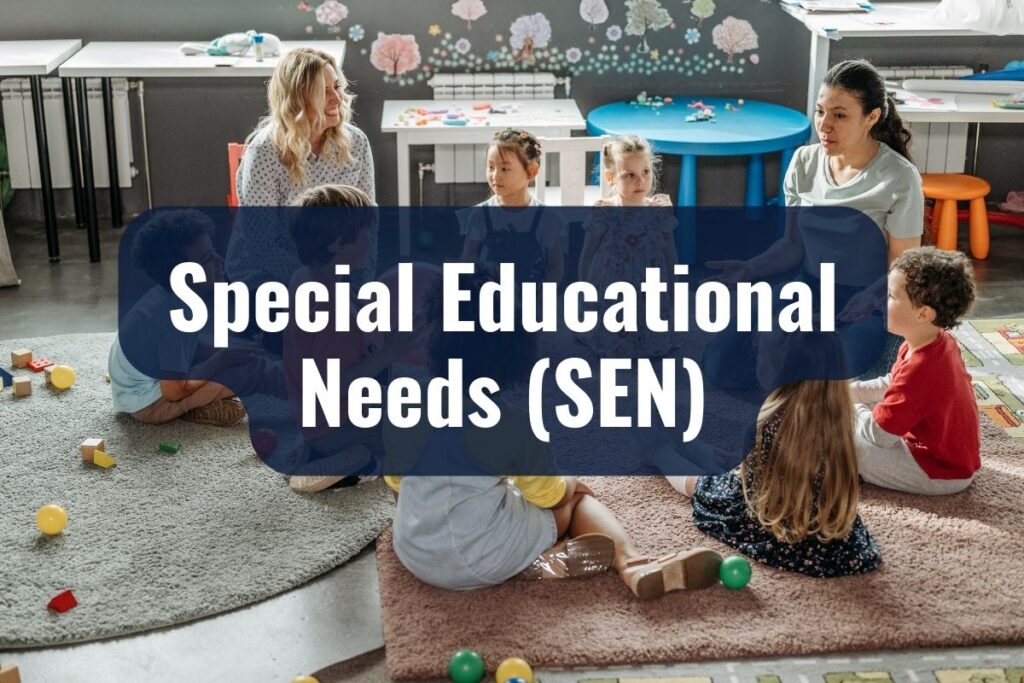As an expat parent in the Netherlands, you might be wondering how the Dutch primary school system functions and, more importantly, how your child will fit into it.
The Dutch education system, with its rich history and emphasis on inclusivity, has a lot to offer. But, getting familiar with the basics can be the difference between feeling lost and feeling empowered.
In this guide, we’ll walk you through the essentials of primary schools in the Netherlands.
Key Takeaways:
- Children typically start school at age 4 and transition to secondary education around age 12.
- There are various types of primary schools, each catering to different educational philosophies and religious affiliations.
- Dutch school calendars include various holidays, with summer break being the longest.
- While Dutch is the primary language of instruction, international schools offer lessons in English and other languages.
- Dutch schools accommodate children with Special Educational Needs (SEN) to ensure inclusive education.
Age and Starting School
A new educational landscape can be both exciting and a tad overwhelming, especially when it comes to understanding the right age to enroll your child. Let’s simplify it for you.
In the Netherlands, children typically start primary school at the age of 4. It’s fascinating to note that although school is not mandatory until they turn 5, most parents opt to send their kids a year earlier. This early start gives children an advantage to adjust, mingle, and get familiar with the school environment before formal education begins.
When your child approaches their fourth birthday, it’s customary to enroll them in the school of your choice. And, even though the official journey begins here, the actual academic obligations don’t commence until they’re 5. Think of the first year, from 4 to 5, as a gentle transition phase, where learning intertwines with play, setting the stage for a holistic educational experience.
For expat families, there’s an additional consideration. If your child is older and you’re transitioning them from a different education system, schools usually place them in a group corresponding to their age. But don’t worry! The school will ensure they are settled into an environment where they feel confident, comfortable, and ready to learn.
Different Types of Primary Schools in the Netherlands

Let’s delve into the different types of primary schools that await your curious explorer in the Netherlands.
| School Type | Description |
| Public Schools | Non-denominational and funded by the government. |
| Special Schools | Follow religious or philosophical beliefs, such as Catholic, Protestant, Montessori, or Waldorf. |
| International | Cater to expat families, offering curricula like IB or British GCSEs. |
| Private Schools | Independently funded, offering alternative teaching methods or specialized programs. |
Public (openbaar) Schools
Operated and funded by the local municipality, these schools are open to all children regardless of their religious or philosophical beliefs. They promote neutrality and focus on offering a broad-based curriculum. The beauty of public schools is their emphasis on inclusivity, ensuring every child, irrespective of background, finds a welcoming environment.
Private (bijzonder) Schools
These are often based on a specific religious or philosophical foundation, such as Catholic, Protestant, Jewish, Muslim, or even anthroposophical (Steiner) beliefs. While they are privately governed, the majority receive government funding, provided they adhere to certain quality standards. If you have a particular faith or philosophy you’d like integrated into your child’s education, private schools offer a wonderful environment for that.
International Schools
A haven for many expat families! These schools primarily cater to international students and often provide instruction in English or another foreign language. They are ideal for families who might be in the Netherlands for a short period or for those who prefer an international curriculum like IB (International Baccalaureate). While they are a fantastic choice for many, they can be pricier than public and private schools.
Learn more about international schools in The Netherlands in this article.
Dalton, Montessori, and Jenaplan Schools
These are examples of schools that follow specific educational philosophies. For instance, Montessori schools emphasize self-directed learning, while Dalton schools promote independence and cooperation. If you lean towards a specific educational approach, it’s worth exploring these options.
School Calendar and Holidays
| Holiday | Date and Duration |
| Autumn Break (Herfstvakantie) | Week-long break in October |
| Christmas Holidays (Kerstvakantie) | Occurring in the last two weeks of December |
| Spring Break (Voorjaarsvakantie or Krokusvakantie) | Week-long break in February |
| Easter (Pasen) | One day (Easter Monday) to an extended weekend |
| May Holidays (Meivakantie) | A week or two in late April or early May |
| Summer Holidays (Zomervakantie) | Lasting for about six weeks between mid-July and late August |
The school calendar in the Netherlands is thoughtfully designed to give children a harmonious mix of education and well-deserved breaks, allowing them to rejuvenate and come back to school with renewed enthusiasm. For expat parents, understanding the school calendar and its rhythm can help you plan family adventures, downtime, or perhaps even that quick escapade back home.
The Dutch primary school year usually begins in late August and runs through to mid-July of the following year. While there is a general pattern, it’s essential to remember that exact dates might vary slightly depending on the region and the school. Here’s a gentle breakdown:
Additionally, schools have a few sporadic days off for teacher training, and it’s always a good idea to keep an eye out for those.
Related: Parental Leave in The Netherlands: English Guide 2023
Language of Instruction

If you’re wondering about the language landscape in Dutch primary schools, let’s explore this language map together, one phrase at a time.
Dutch as the Primary Language
Most Dutch primary schools use Dutch as the language of instruction. For little ones, this can be quite an immersive experience. The silver lining? Children are linguistic sponges! With the right support and environment, they often pick up a new language faster than we might anticipate. This immersion can be a golden opportunity for them to become bilingual, enhancing cognitive abilities and cultural understanding.
Support for Non-Dutch Speakers
If you’re concerned about your child diving headfirst into a Dutch-speaking environment, fret not! Many schools offer additional support for non-Dutch-speaking students. This might come in the form of extra language lessons or tailored support in the classroom. The goal is to ensure every child feels confident and supported in their linguistic journey.
International Schools and Language
International schools are a beacon for families seeking instruction primarily in English (or another foreign language). These schools offer instruction in a familiar language and integrate an international curriculum. They understand the nuances of expat life and create an environment where diverse languages and cultures intersect harmoniously.
Curriculum Overview
If you’ve been pondering what your child will learn in those quaint Dutch school buildings, let’s find out together.
Core Subjects
The heart of the Dutch primary school curriculum revolves around key subjects:
- Language Arts (Dutch): Focuses on reading, writing, listening, and speaking skills. For non-native speakers, this can be an excellent window into mastering the Dutch language.
- Mathematics: Beyond just numbers, it encompasses critical thinking, problem-solving, and logical reasoning.
- World Orientation: This combines geography, history, and social studies, encouraging children to understand and appreciate the world around them.
- Natural Sciences: An exploration into the wonders of nature, biology, and the environment.
- Creative Arts: From drawing to crafting, children are encouraged to express their imagination and creativity.
Physical Education
Integral to their overall development, children engage in sports, games, and physical activities, ensuring they understand the importance of a healthy body to accompany a curious mind.
Social and Emotional Development
A standout feature of Dutch education, schools significantly emphasize personal and social development. Lessons often incorporate discussions about feelings, relationships, and personal challenges, ensuring children are emotionally intelligent and empathetic.
Civic Education
Children learn about their rights, responsibilities, and the essence of being a good citizen by instilling a sense of community and understanding of societal structures.
For many expat parents, a heartening aspect of the Dutch curriculum is its flexibility. Teachers often tailor their lessons to cater to the unique needs, abilities, and interests of their students. The system celebrates individuality while ensuring each child gets a holistic, well-rounded education.
Special Educational Needs (SEN)

The Netherlands, with its inclusive and forward-thinking approach, embraces children with Special Educational Needs (SEN) with open arms, ensuring they too embark on a fulfilling educational journey.
Understanding SEN: In the Dutch context, Special Educational Needs can encompass a wide range of challenges – from learning difficulties such as dyslexia to physical disabilities, and from behavioral challenges to giftedness. The Dutch believe in recognizing and nurturing each child’s individual needs.
Passend Onderwijs (Suitable Education): Introduced in 2014, this policy ensures that all children, regardless of their needs, get a suitable place in education. Schools are bound by duty to find or create an appropriate learning environment for every student.
Individualized Support: If a child is identified with SEN, the school will often craft an individualized education plan (IEP). This plan tailors the learning experience to the child’s unique needs, ensuring they get the required support, be it additional tutoring, therapy, or special resources.
Special Schools: While the emphasis is on integrating children with SEN into regular schools, the Netherlands also offers specialized schools for those who might benefit from a more tailored environment. These institutions are equipped with resources, professionals, and methodologies specifically designed for children with particular challenges.
Collaboration with Parents: You, as parents, are integral to this process. Schools often work closely with families, ensuring that the support a child receives is consistent, both at school and at home. Your insights, observations, and concerns are invaluable in shaping the child’s educational journey.
Parent Involvement
In the Netherlands, the involvement of parents in their child’s schooling isn’t just encouraged; it’s celebrated. Let’s explore the beautiful collaboration between home and school in the Dutch primary education landscape.
Traditionally known as ‘10-minutengesprekken‘, these regular meetings are short, focused conversations where parents and teachers discuss a child’s progress, challenges, and triumphs. It’s a dedicated space for collaboration, ensuring the child’s well-being and growth remains central.
Want to get involved at a deeper level? Many schools have a Parent Council, where parents actively participate in organizing school events, activities, and sometimes even influence school policies. It’s an opportunity to contribute your skills and insights to enrich the school community.
Dutch schools often welcome parental involvement in various school activities, from assisting in reading sessions, accompanying on school trips, to lending a hand during special events or festivities. It’s a delightful way to be a part of your child’s school life, witnessing their environment and building connections with educators and other parents.
Dutch schools usually have an open-door policy. If you have concerns, questions, or insights, you’re encouraged to approach the teachers or school management. Building a trusting relationship, grounded in open communication, ensures the best for your child.
Many schools utilize digital platforms or apps to keep parents in the loop. From sharing announcements and newsletters to showcasing your child’s recent art project, these platforms bridge the gap between home and school, ensuring you’re always connected.
Extracurricular Activities

Extracurricular activities in Dutch primary schools are not just a delightful afterthought; they’re an integral chapter of a child’s holistic development. Let’s dive into the colorful world of activities that stretch beyond the classroom, nurturing passions and fostering lifelong skills.
Sports
The Dutch love their sports! Many schools offer a variety of athletic programs, from the nation’s beloved football (soccer) to gymnastics, tennis, and more. Participating in these activities not only keeps the children physically fit but also instills values like teamwork, discipline, and resilience.
Music and Arts
For those little souls that sway to every tune or see the world as a canvas, schools often provide music lessons, choir practices, and art workshops. These sessions are wonderful outlets for children to express, innovate, and appreciate the world of sounds and colors.
Cultural Activities
Embracing the rich cultural tapestry of the Netherlands, schools often organize traditional dance lessons, folklore storytelling sessions, and celebrations of Dutch festivities. It’s a beautiful way for children, especially those from diverse backgrounds, to immerse themselves in the local culture.
Clubs and Societies
From the eco-club dedicated to green initiatives, the chess club for strategic minds, to the drama society for thespians-in-making, many schools host an array of clubs. These platforms allow students to discover and hone their interests and passions.
Language and Exchange Programs
Given the international fabric of the Netherlands, some schools offer additional language classes or cultural exchange programs. These programs give children a window into diverse cultures, fostering global understanding and friendships.
Transition to Secondary School
Let’s walk hand-in-hand through this pivotal transition and demystify the bridge from primary to secondary school.
The Advising Process
As the end of primary school approaches, teachers play a pivotal role in advising parents and students on the next step. This advice is based on the child’s academic performance, interests, and capabilities. It’s a personalized guide, ensuring the chosen path aligns with the student’s potential and aspirations.
CITO Test
In the final year of primary school, students usually undertake the CITO test (though some schools may opt for other standardized tests). This nationwide assessment evaluates students’ aptitude in language, math, and study skills, providing further insights for secondary school placement.
Types of Secondary Schools
The Dutch system is unique, offering different types of secondary education based on academic rigor and vocational orientation. Post primary, students might transition to:
- VMBO (Preparatory Middle-level Vocational Education)
- HAVO (Higher General Secondary Education)
- VWO (Pre-University Education)
Each stream caters to varied academic and vocational interests, ensuring every child finds a fitting educational path.
Open Days
Most secondary schools host open days, where students and parents can tour the facilities, meet teachers, and get a feel of the new environment. These days are wonderful opportunities to ask questions, alleviate anxieties, and make informed decisions.
The Emotional Quotient
Beyond academics, this transition is also an emotional journey. Schools often facilitate workshops or counseling sessions, helping students navigate the swirl of emotions, from excitement to apprehension, ensuring they are emotionally equipped for this new chapter.
Related: International Schools in the Netherlands (2023 Guide)
Tips for Expat Parents

To make this journey smoother, and filled with moments of joy and learning, here are some great tips tailored just for you:
- Embrace the Dutch Way: While every education system has its essence, the Dutch approach values individuality, holistic development, and community spirit. Instead of drawing comparisons, embrace this unique approach, and you’ll soon appreciate its wonders.
- Language Learning Together: If Dutch isn’t your home language, consider taking beginner courses alongside your child. It’s a beautiful way to bond, support their learning, and immerse yourself in the local culture.
- Stay Connected: Actively participate in parent-teacher meetings, school events, and other community gatherings. It’s not just about staying informed; it’s about building bonds, understanding your child’s world, and being an integral part of their school journey.
- Open Conversations: Encourage your child to express their feelings, questions, or concerns about school. Whether it’s a new friendship, a challenging subject, or an exciting school event, make them feel that home is a safe space to share and reflect.
- Seek Support: If you ever feel overwhelmed or uncertain, remember you’re not alone. Many schools have international parent communities, and there are numerous expat groups and forums where you can seek advice, share experiences, and find camaraderie.
- Celebrate Diversity: Teach your child to embrace their unique background and culture, while also being open to learning from their peers. This not only fosters global citizenship but also instills confidence and pride in their identity.
- Stay Curious: Dive into the local customs, festivities, and traditions associated with schooling. Whether it’s the delightful ‘Sinterklaas’ celebration in December or the intricacies of the ‘CITO’ test, approach everything with curiosity and enthusiasm.
- Trust the Journey: Every transition, especially in a new country, comes with its set of challenges and joys. Trust the process, the educators, and most importantly, trust your child’s resilience and adaptability.



